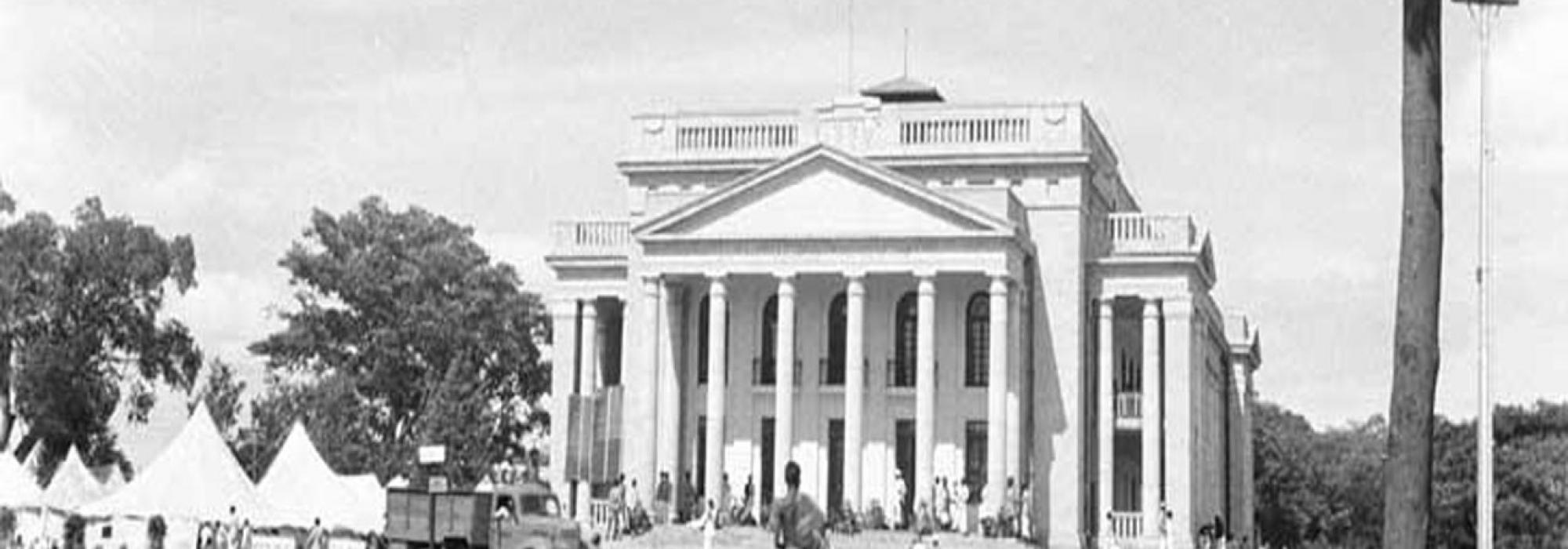K.P. Puttanna Shetty was the deputy commissioner of Kolar during 1903-04. On one of those days, K.P Puttanna Shetty inaugurated a library in one of the clubs of Kolar. I listened to the speech he delivered that day. I was a high school student then. Someone had taken me along to this event. His speech may have lasted for about five minutes. It was in English. His choice of words and the emotions hidden in them appealed to my mind. Only so many words as to stay appropriate. It was brief and simple. My appreciation and admiration towards him blossomed as a result.
After about a year from then, he visited Mulbagal while he was travelling on official duty. I was working as a substitute teacher there. An event transpired therein. This may seem like a bit of self-glorification; readers should please condone.
School inspection
Puttanna Shetty came to the school and inspected all the classes. It was a customary practice of those times for the deputy commissioner to inspect all the government organizations which came under any of the departments. He paid a visit to our school accordingly. He came to the class that I was teaching and asked some questions. I presented him with appropriate answers. After the inspection was done, our headmaster placed a visitors’ book before him. Puttanna Shetty wrote down his appreciation in a couple sentences and wrote a couple of points about me in the book. Our headmaster was elated by this. By the time it was evening, it spread all over the town and created an uproar. This turned out to be torturous to me, in the following way:
My father and his friends got together and thought, this is a fortuitous situation. It shouldn’t go wasted. It must be made use of. Meaning, we’ve to get this lad to write out a letter requesting for employment and present it to the deputy commissioner ourselves. No sooner than the commissioner reads out the request, a job shall be his for sure! They decided so and compelled me to write up a letter. I was obstinate about not taking up a government job. Debate went on till midnight. Since I’m of the old school when it comes to values, I felt I had to bow down to the words of elders. I even ended up writing down a petition. A resolution was reached to go to the travellers’ bungalow the following afternoon to hand over the plea.
Plan
Deputy commissioner shall accept petitions from three to four o'clock in the afternoon; He doesn’t have any spare time apart from this. Therefore me, my father and three-four of his friends must be at the travellers’ bungalow exactly by three o’clock - along with the written plea. This was the plan.
There arose another problem; about me wearing a rumāl. This led to a big commotion. I was used to wearing topi. I didn’t like rumāl. After this debate had ensued for a long time, Subba Bhatta, one of the friends of my father intervened. I need not walk on the streets with rumāl on my head; I can walk with a topi until I reach the bungalow. Upon entering the compound, I must switch to rumāl only for an instant until I meet with the commissioner.
Test of my luck
I agreed to this - without any other option at sight. I held a rumāl cloth in one of my hands and walked. My father held the written plea in his hand and marched forward. This cavalcade entered the travellers’ bungalow from the rear-entrance on the northern side. Time was already four o'clock by then.
When my father went to the front door of the bungalow to enquire, a clerk there said “Saheb just went back inside. He won’t be able to meet with you now. Mail him your petition through post.”
Matter of submitting a petition ended there. But I continued receiving my dues generously over the next two-three weeks on a day to day basis. “Not someone who listens to what’s being said”, “Brooder”, “Egotistic”, “Has no regard for elders’ say”, “Obstinate bugger”, “Gone astray for sure”, “Boisterous thug” and so on... My father was very disappointed. Proportional to his disappointment was the severity of words. At last, honourable Subba Bhatta stood on my side. “Forget it. Does this mean it’s the end of his fate? If God’s will persist, he’ll get into one or the other job. He won’t die of starvation.” He extended his assurances this way.
I narrated this incident to Puttanna Shetty a long time after it had transpired, he laughed heartily.
Perpetual smiling face
I don’t remember now about how we met after I came to Bangalore (1905-07). But I remember K. Ramachandra Rao had taken me to meet with Puttanna Shetty after my book “Raṅgācārlu” was published. Nothing would seem special to anyone if I said Puttanna Shetty always treated me affectionately. He treated everyone that way. He never met any of his visitors grumbling. He talked to everyone with a smiling face. What’s so special about this?
Perpetually smiling face in itself is special.
Can the people who question its specialty retain an ever-smiling face? Only for the ones with genuine goodness and pleasant state of mind is it possible to maintain an ever-smiling face. If this is not the case, then it will be fake. I cannot accept a least bit that Puttanna Shetty was one such person who faked. He’d somehow earned one the qualities of Sri Rama. Sri Rama was:
स्मित-पूर्वाभि-भाषी
“Speech, always preceded by a smile” - Thus Vālmīkī has revealed to us. This eternal serenity had manifested in Puttanna Shetty. I’ve figured it out from hundreds of my experiences.
Presidency of the Municipal Council
His character and conduct were well appreciated by Visvesvaraya. Visvesvaraya often visited Puttanna Shetty’s home and expressed his respect. Only with relevant administrative experiences, virtuous people who have gained affection and admiration of the common-masses can accomplish substantial magnitude of work for the benefit of the public if they’ve familiarized themselves with the affairs of the state; It’s a crucial responsibility of the government to provide an opportunity and to encourage such people - this was Visvesvaraya’s belief. In consonance with this, he gave such an opportunity to Puttanna Shetty during his initial days of becoming the Diwan. It was his wish that respectable people like Puttanna Shetty should serve as the president of Bangalore’s municipal council. When this was brought up before Puttanna Shetty, he came up with a precondition: “If public work has to progress in a swift manner, sanctions and other authorizations from the government must reach the municipality promptly. This necessitates that the Diwan himself should manage Bangalore’s municipality’s portfolio. There must be no animosity between say a government's councillor and a retired councillor of the municipality. If you can personally take care of the government’s accountability, I shall then shoulder the responsibility as per your wish.” he said. Visvesvaraya happily agreed.
During those days, my visits to Puttanna Shetty were a routine. On one such afternoon, an agent of a motor company showed up with a new car and invited Puttanna to drive with him. Puttanna Shetty turned to me and said:
“I’m not even the president yet, and already the pandemonium of these motor patrons (lobbyist) have begun.”
Whenever I met with him, he either talked about public affairs or some topic in history or about the ethics etc. His conversations were brief yet full of substance. There was no hollow talk.
A few days after Puttanna Shetty became the president, Visvesvaraya made plans for developing the city. He had called for a general body meeting at the city market square. A large gathering had assembled. While he was elaborating on some topic. I raised a point then. Visvesvaraya turned to me and said:
“You’re a big critic. What can be achieved by mere criticism? Work with us and understand our difficulties.”
I kept quiet.
This is the first part of the five-part English translation of the Sixth essay in D V Gundappa’s magnum-opus Jnapakachitrashaale (Volume 6) – Halavu Saarvajanikaru. Edited by G S Raghavendra.















































